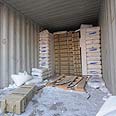
US indictments offer glimpse into Hezbollah funding methods
Investigation spanning three years results in indictments against three businessmen who exported electronic equipment to shopping center in Paraguay in South America's infamous Tri-Border Region. According to indictment, share of profits from products' sale ended up with Islamic terror organization
WASHINGTON – Indictments which were filed over the weekend in Miami against three businessmen offer a glimpse into Hezbollah's funding methods in South America.
Following an investigation spanning three years, the three suspects were charged with supplying electronic equipment to a shopping center in Paraguay. Documents filed with the court by the US Treasury Department also provide details regarding the terror organizations' funding tactics.
The three suspects are Khaled Safadi, 56, and 43-year-old Emilio Gonzalez, both of Miami; and 46-year-old Ulises Talavera-Campos, a citizen of Paraguay. They are accused of supplying thousands of playstation devices and cameras to the Galeria Page shopping center in Ciudad del Este in the Tri-Border Region which connects Paraguay, Brazil and Argentina.
The shopping center was defined by the US Treasury Department as Hezbollah's financial headquarters and is situated in a region which local law authorities have little control over.
A fourth suspect not yet apprehended is Samer Mehdi, 37, a citizen of both Paraguay and Brazil who is the owner of the Galeria Page shopping center.
According to the indictment, Safadi used to provide the equipment to the two other defendants and they in turn transferred it to Paraguay. The three would use fake addresses in export documents in order to conceal the real destination of the goods.
South American network
John Morton, assistant secretary of homeland security, said the shopping center in Ciudad del Este has been under surveillance for several years. Its manager, Muhammad Yusif Abdallah, is suspected of regularly transferring a share of the center's profits to Hezbollah.
A US Treasury document dated four years ago suggests that the shopping center is part of a South American network run by Assad Ahmad Barakat who has been on the US terrorist blacklist since 2004.
During the court hearing the federal prosecution motioned to deny the suspects bail, fearing they would flee the country.
Safadi's attorney Michael Tein mocked the prosecution for arresting people over video games. "Terrorism?" Tein said. "More like 'The Great Sony Playstation Caper.' The indictment literally charges them with selling Playstation 2 video games to Paraguay. That's some weapon of mass destruction."
AP contributed to this report










